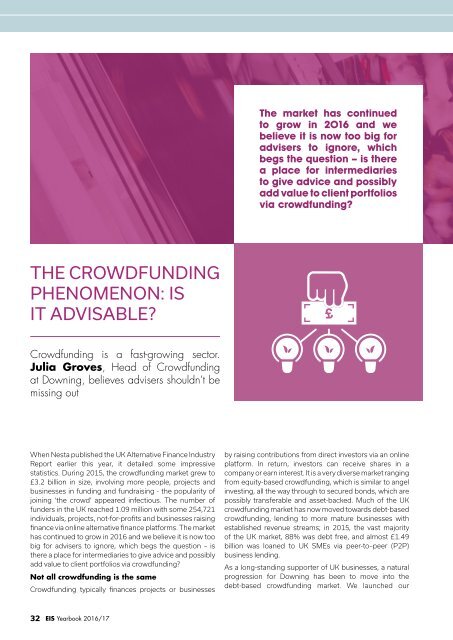2fnoNyY
2fnoNyY
2fnoNyY
You also want an ePaper? Increase the reach of your titles
YUMPU automatically turns print PDFs into web optimized ePapers that Google loves.
The market has continued<br />
to grow in 2016 and we<br />
believe it is now too big for<br />
advisers to ignore, which<br />
begs the question – is there<br />
a place for intermediaries<br />
to give advice and possibly<br />
add value to client portfolios<br />
via crowdfunding?<br />
THE CROWDFUNDING<br />
PHENOMENON: IS<br />
IT ADVISABLE?<br />
Crowdfunding is a fast-growing sector.<br />
Julia Groves, Head of Crowdfunding<br />
at Downing, believes advisers shouldn’t be<br />
missing out<br />
When Nesta published the UK Alternative Finance Industry<br />
Report earlier this year, it detailed some impressive<br />
statistics. During 2015, the crowdfunding market grew to<br />
£3.2 billion in size, involving more people, projects and<br />
businesses in funding and fundraising - the popularity of<br />
joining ‘the crowd’ appeared infectious. The number of<br />
funders in the UK reached 1.09 million with some 254,721<br />
individuals, projects, not-for-profits and businesses raising<br />
finance via online alternative finance platforms. The market<br />
has continued to grow in 2016 and we believe it is now too<br />
big for advisers to ignore, which begs the question – is<br />
there a place for intermediaries to give advice and possibly<br />
add value to client portfolios via crowdfunding?<br />
Not all crowdfunding is the same<br />
Crowdfunding typically finances projects or businesses<br />
by raising contributions from direct investors via an online<br />
platform. In return, investors can receive shares in a<br />
company or earn interest. It is a very diverse market ranging<br />
from equity-based crowdfunding, which is similar to angel<br />
investing, all the way through to secured bonds, which are<br />
possibly transferable and asset-backed. Much of the UK<br />
crowdfunding market has now moved towards debt-based<br />
crowdfunding, lending to more mature businesses with<br />
established revenue streams; in 2015, the vast majority<br />
of the UK market, 88% was debt free, and almost £1.49<br />
billion was loaned to UK SMEs via peer-to–peer (P2P)<br />
business lending.<br />
As a long-standing supporter of UK businesses, a natural<br />
progression for Downing has been to move into the<br />
debt-based crowdfunding market. We launched our<br />
32 EIS Yearbook 2016/17


